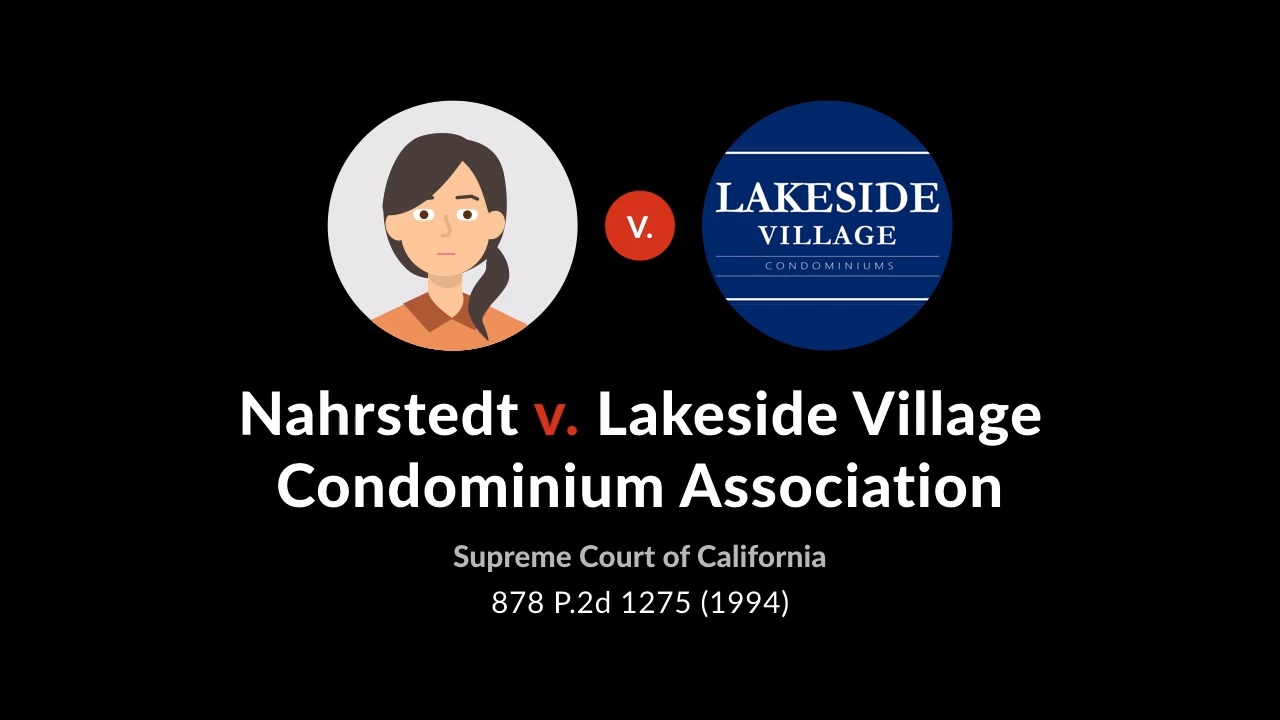In the groundbreaking case of Nahrstedt v. Lakeside Village Condominium Association Inc., the legal landscape governing condominiums has been irrevocably altered. This case, which has garnered significant attention within the legal community, has established important precedents and set forth clear guidelines for the rights and responsibilities of condominium owners and associations.
The case centers around a dispute between a condominium owner, Nahrstedt, and her condominium association, Lakeside Village Condominium Association Inc. Nahrstedt alleged that the association had violated her rights by imposing unreasonable restrictions on her use of common areas and by failing to maintain the property in a satisfactory condition.
Nahrstedt v. Lakeside Village Condominium Association Inc.: Case Overview

Nahrstedt v. Lakeside Village Condominium Association Inc. is a landmark case in condominium law that addresses the issue of whether condominium associations have the authority to restrict the use of common areas by unit owners. The case arose from a dispute between a condominium owner, Susan Nahrstedt, and the Lakeside Village Condominium Association Inc.
over Nahrstedt’s use of the association’s common areas for her business.
The significance of this case lies in its clarification of the rights and responsibilities of condominium owners and associations. The court’s decision established important legal principles that have shaped the way condominium associations are governed and managed.
Nahrstedt’s Claims and Arguments
Susan Nahrstedt, the plaintiff in the case, claimed that the Lakeside Village Condominium Association Inc. had violated her rights as a unit owner by prohibiting her from using the common areas for her business. Nahrstedt argued that the association’s restrictions were unreasonable and violated her right to use and enjoy her property.
Nahrstedt presented evidence that she had been using the common areas for her business for several years without any complaints from the association. She also argued that the association’s restrictions were discriminatory because they only applied to her and not to other unit owners who used the common areas for commercial purposes.
Lakeside Village Condominium Association Inc.’s Defenses and Arguments
The Lakeside Village Condominium Association Inc., the defendant in the case, argued that it had the authority to restrict Nahrstedt’s use of the common areas because it was necessary to protect the interests of the other unit owners.
The association presented evidence that Nahrstedt’s use of the common areas was causing noise, traffic, and other disturbances that were affecting the enjoyment of the other unit owners. The association also argued that Nahrstedt’s business was not compatible with the residential character of the condominium complex.
Court’s Analysis and Decision
The court analyzed the legal issues presented in the case and concluded that the Lakeside Village Condominium Association Inc. had the authority to restrict Nahrstedt’s use of the common areas.
The court reasoned that the association’s restrictions were reasonable and necessary to protect the interests of the other unit owners. The court also found that Nahrstedt’s use of the common areas was not compatible with the residential character of the condominium complex.
Implications of the Decision, Nahrstedt v. lakeside village condominium association inc
The decision in Nahrstedt v. Lakeside Village Condominium Association Inc. has significant implications for condominium owners and associations.
The decision clarifies that condominium associations have the authority to restrict the use of common areas by unit owners if the restrictions are reasonable and necessary to protect the interests of the other unit owners.
The decision also provides guidance to condominium associations on how to develop and enforce restrictions on the use of common areas. The decision establishes that associations must consider the impact of their restrictions on the rights of unit owners and must balance the interests of all unit owners when making decisions about the use of common areas.
FAQ Compilation: Nahrstedt V. Lakeside Village Condominium Association Inc
What were the key legal issues at stake in Nahrstedt v. Lakeside Village Condominium Association Inc.?
The key legal issues at stake in the case were the rights and responsibilities of condominium owners and associations, the enforceability of condominium rules and regulations, and the duty of condominium associations to maintain common areas.
What were the main arguments presented by Nahrstedt in her lawsuit?
Nahrstedt argued that the Lakeside Village Condominium Association Inc. had violated her rights by imposing unreasonable restrictions on her use of common areas and by failing to maintain the property in a satisfactory condition.
What was the significance of the court’s decision in Nahrstedt v. Lakeside Village Condominium Association Inc.?
The court’s decision clarified the legal duties and obligations of condominium associations and provided a framework for resolving disputes between owners and associations. It also established important precedents for the rights of condominium owners.

